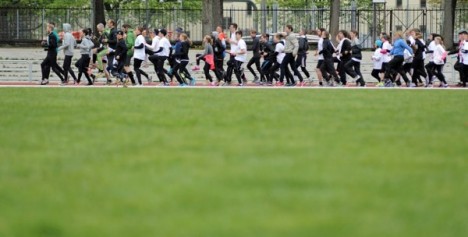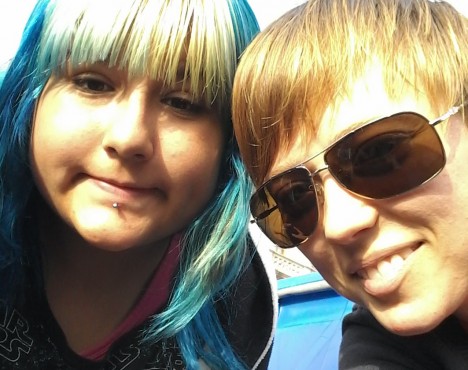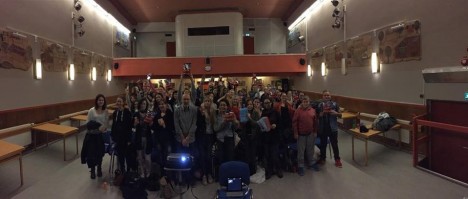Alumni stories: How to mentor and make friends

The learning process doesn't end after you graduate. Anna Kryvenda is an SI Alumn who stayed in Sweden after her programme - and found a way to continue her education while helping teenagers and making new friends. Anna tells SI News what it's like to be a mentor.
They say learning is a life-long process. Moving to a new country for a Master’s programme and struggling to adapt to the culture and learn the language can be tough, but the benefits are innumerable.
And even when students graduate from the NFGL programme, the opportunities presented by the programme are endless.
Anna Kryvenda from Ukraine finished her studies in Sweden several years ago, but she stayed after the programme and today she lives and works in Gothenburg. And in her freetime she’s still learning – and teaching.
“I am participating in a mentorship programme for teenagers, where kids between 13 and 17 can get an adult friend,” Anna says.
The aim of the programme is to help teenagers get through tough periods. Mentor Sweden is a Swedish NGO that was established in 1994 on the initiative of Queen Silvia of Sweden. The programmes promote health and prevent drug abuse, while building confidence in young people and creating healthy inspirational relationships between adults and youth.
“I saw a poster in a café in central Gothenburg for the programme,” Anna says. “The poster asked, ‘Do you want to give a teenager the power to grow?’ And I thought, ‘Yes, I do!’”
At the time Anna unfortunately did not have the time. But she took a picture of the poster and kept it on her phone.
“And then the time came when I looked at it and thought, ‘Yes, now it is time’.”

A relay event organized by a mentor. Photo: Private
Adults who apply for the programme are interviewed and selected, and attend a half-day mentor education seminar before being matched with a kid based on background, family situation, hobbies, and personality.
“As a mentor, your main task is to be there for your mentee,” Anna says. “You should try to meet at least twice a month, but the rest is just guidelines.”
Once a month the staff also organize an activity for all mentor pairs. These can be bowling, laser dome, quiz evenings, game nights, or any other number of activities.
“You can meet for a walk or a fika in a café with a serious talk. You can go to the cinema, do go-carting… The list is endless,” Anna says.
She says it feels incredible to have the chance to take part in a teenager’s journey, at a time of life when they are changing all the time.
“At some points you feel like you are talking to a kid, but a minute later you are suddenly having a philosophical discussion about bullying, relationships, or career planning,” she remarks. “They never stop surprising!”

Anna and her mentee. Photo: Private
But the kids aren’t the only ones who benefit.
“Sometimes I wonder who mentors whom,” Anna laughs. “Having a close friend who can introduce you to the Swedish culture and life, and who challenges you to understand another point of view – those are just a few of the benefits for mentors.”
For Anna, the most memorable moment of the year-long mentorship was at its end, reflecting upon the experience.
“My mentee said that the best part of the year was getting to know me. She also said that she now knows that friendship has no age limit.”
Anna and her young friend now hope to share their experience with others, and encourage other students and alumni to get involved.
“I think the programme would give NFGL members a wonderful chance to get to know the Swedish culture and daily life better,” Anna says, “While also making it possible to have a positive impact in someone’s life. This kind of mentorship is very enriching for both parties.”

Movie night with mentor.se.
The programme does require that mentors can have a conversation in Swedish – but Anna notes that it’s a great motivating factor to learn the language and to practice it.
“It’s also great for alumni who have learned Swedish. And even if you don’t take part in the programme in Sweden, it could be inspiration to start a similar initiative back home,” Anna hopes.
In short, it was a life-changing experience that Anna would recommend to all of her fellow alumni.
“The year of mentorship has given me insights in the life of a Swedish family, a teenager, education system in this country,” she says.
“It has also given me a friend who will surely stay with me for long time. This experience is definitely worth some of my time and the consequences of it will stay with me for many years.”
Comments
See Also
They say learning is a life-long process. Moving to a new country for a Master’s programme and struggling to adapt to the culture and learn the language can be tough, but the benefits are innumerable.
And even when students graduate from the NFGL programme, the opportunities presented by the programme are endless.
Anna Kryvenda from Ukraine finished her studies in Sweden several years ago, but she stayed after the programme and today she lives and works in Gothenburg. And in her freetime she’s still learning – and teaching.
“I am participating in a mentorship programme for teenagers, where kids between 13 and 17 can get an adult friend,” Anna says.
The aim of the programme is to help teenagers get through tough periods. Mentor Sweden is a Swedish NGO that was established in 1994 on the initiative of Queen Silvia of Sweden. The programmes promote health and prevent drug abuse, while building confidence in young people and creating healthy inspirational relationships between adults and youth.
“I saw a poster in a café in central Gothenburg for the programme,” Anna says. “The poster asked, ‘Do you want to give a teenager the power to grow?’ And I thought, ‘Yes, I do!’”
At the time Anna unfortunately did not have the time. But she took a picture of the poster and kept it on her phone.
“And then the time came when I looked at it and thought, ‘Yes, now it is time’.”

A relay event organized by a mentor. Photo: Private
Adults who apply for the programme are interviewed and selected, and attend a half-day mentor education seminar before being matched with a kid based on background, family situation, hobbies, and personality.
“As a mentor, your main task is to be there for your mentee,” Anna says. “You should try to meet at least twice a month, but the rest is just guidelines.”
Once a month the staff also organize an activity for all mentor pairs. These can be bowling, laser dome, quiz evenings, game nights, or any other number of activities.
“You can meet for a walk or a fika in a café with a serious talk. You can go to the cinema, do go-carting… The list is endless,” Anna says.
She says it feels incredible to have the chance to take part in a teenager’s journey, at a time of life when they are changing all the time.
“At some points you feel like you are talking to a kid, but a minute later you are suddenly having a philosophical discussion about bullying, relationships, or career planning,” she remarks. “They never stop surprising!”

Anna and her mentee. Photo: Private
But the kids aren’t the only ones who benefit.
“Sometimes I wonder who mentors whom,” Anna laughs. “Having a close friend who can introduce you to the Swedish culture and life, and who challenges you to understand another point of view – those are just a few of the benefits for mentors.”
For Anna, the most memorable moment of the year-long mentorship was at its end, reflecting upon the experience.
“My mentee said that the best part of the year was getting to know me. She also said that she now knows that friendship has no age limit.”
Anna and her young friend now hope to share their experience with others, and encourage other students and alumni to get involved.
“I think the programme would give NFGL members a wonderful chance to get to know the Swedish culture and daily life better,” Anna says, “While also making it possible to have a positive impact in someone’s life. This kind of mentorship is very enriching for both parties.”

Movie night with mentor.se.
The programme does require that mentors can have a conversation in Swedish – but Anna notes that it’s a great motivating factor to learn the language and to practice it.
“It’s also great for alumni who have learned Swedish. And even if you don’t take part in the programme in Sweden, it could be inspiration to start a similar initiative back home,” Anna hopes.
In short, it was a life-changing experience that Anna would recommend to all of her fellow alumni.
“The year of mentorship has given me insights in the life of a Swedish family, a teenager, education system in this country,” she says.
“It has also given me a friend who will surely stay with me for long time. This experience is definitely worth some of my time and the consequences of it will stay with me for many years.”
Join the conversation in our comments section below. Share your own views and experience and if you have a question or suggestion for our journalists then email us at [email protected].
Please keep comments civil, constructive and on topic – and make sure to read our terms of use before getting involved.
Please log in here to leave a comment.